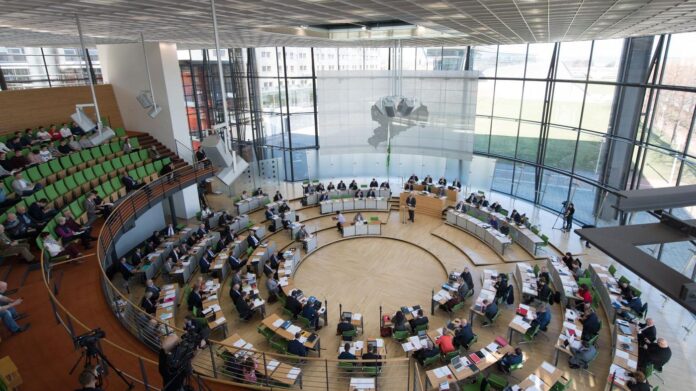
After the AfD’s strong performance in the state elections in Thuringia and Saxony, the CDU wants to provide the head of government in both states – but lengthy and complicated coalition talks are looming. Saxony’s Prime Minister Michael Kretschmer (CDU) continued to rule out a merger with the second-placed AfD on Monday and is now considering a coalition with the SPD and the new Sahra Wagenknecht (BSW) alliance.
“It won’t be easy. It will also take time. But it is possible,” Kretschmer said on Deutschlandfunk. In Thuringia, CDU state leader Mario Voigt also wants to start talks with the SPD and BSW.
Thuringian CDU in a dilemma
The problem in Thuringia: Such an alliance of CDU, SPD and BSW together only has 44 state parliament seats, 45 would be needed for a majority. A coalition of CDU, BSW and the Left would have a majority. The dilemma here is that an incompatibility resolution prohibits the CDU from working with the AfD or the Left.
One of the ideas being discussed is that the Left Party of the current head of government Bodo Ramelow will tolerate a CDU-led minority government in the future without being part of the government. “We are moving into a new situation here,” said Voigt at a press conference with CDU federal chairman Friedrich Merz and Kretschmer.
The AfD, led by right-wing extremist Björn Höcke, is clearly the strongest party in Thuringia with 32.8 percent of the vote and is left out. The 52-year-old dreams of governing and wants to offer talks to the other parties. But they want to turn down the offer because no one wants to form a coalition with the AfD.
AfD wants to exert influence in Thuringia
The AfD, which the state’s Office for the Protection of the Constitution classifies as “certainly right-wing extremist”, is nevertheless gaining power, because with more than a third of the seats in the state parliament, it has a so-called blocking minority and can block important decisions and elections that must be decided by a two-thirds majority. One example is the election of state constitutional judges. “We will use our newly granted power to shape things,” said co-state chairman Stefan Möller on the subject.
The CDU must now ask itself whether it is opening up to the Left Party, said political scientist Oliver Lembcke to the German Press Agency. But this would inevitably reignite the discussion about the firewall to the right, to the AfD, said the expert from the Ruhr University Bochum.
In fact, a prominent member of the state parliament made such a move and demanded that the state CDU should enter into exploratory talks not only with the Left Party, but also with the AfD. Respect for the voters requires that we also talk to them, said the president of the Thuringian District Council, Martina Schweinsburg, to the dpa.
Saxony’s head of government: No cooperation with AfD
After the state election, Saxony’s Prime Minister Michael Kretschmer clearly ruled out cooperation with the AfD – and also a coalition with the Left Party – as he had done before. The CDU state leader and top candidate in Berlin said of the AfD: “The party will take on an opposition role, in a democracy that is an important matter.”
The election result gives the CDU the chance to form a stable government. Forming one will not be easy and will not happen quickly. Mathematically, an alliance between the CDU and the coalition of Sahra Wagenknecht and the SPD or the Greens would be possible.
Kretschmer called the CDU’s incompatibility resolution, which affects the AfD and the Left, “absolutely correct”. In this election campaign, the AfD has once again demonstrated malice and disdain towards democracy and political competitors. With radicals and right-wing extremists in the party’s leadership, “it won’t work” – that was clear even before the election.
The CDU’s incompatibility resolution states that it may neither form a coalition with the AfD or the Left Party nor maintain “similar forms of cooperation.”
According to Kretschmer, there are “gradual differences” in attitudes towards the Left Party. They have worked together responsibly in recent years, for example a year ago they drafted a cross-party resolution on migration. “We supported this together because it was clear then that we have a civic responsibility,” he said. “The incompatibility resolution means participation in government, it means structural cooperation.”
Glitch in state election result in Saxony
Curiously, there was a glitch in the calculation of the seat distribution in the new Saxon state parliament. Due to a software error, an incorrect number of seats was published after the election, as the state election commission announced. They had to correct the result.
According to this, the Greens and the SPD will each get one seat more, and the CDU and the AfD will each get one seat less than initially stated. Despite the change, the previous coalition of the CDU, Greens and SPD still does not have a majority in the new state parliament. However, the recalculation means that the second-placed AfD will lose the so-called blocking minority in the state. According to the previously published figures, it would have had more than a third of the seats in Dresden, but it just missed this.
© dpa-infocom, dpa:240902-930-220905/1
This is a message directly from the dpa news channel.
